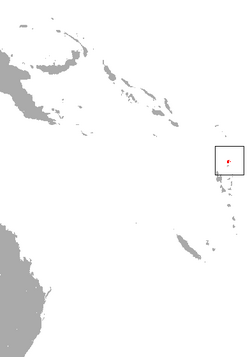Biology:Banks flying fox
| Banks flying fox | |
|---|---|
| Scientific classification | |
| Domain: | Eukaryota |
| Kingdom: | Animalia |
| Phylum: | Chordata |
| Class: | Mammalia |
| Order: | Chiroptera |
| Family: | Pteropodidae |
| Genus: | Pteropus |
| Species: | P. fundatus
|
| Binomial name | |
| Pteropus fundatus Felten & Kock, 1972
| |

| |
| Banks flying fox range | |
The Banks flying fox (Pteropus fundatus) is a species of megabat in the family Pteropodidae. It is endemic to Vanuatu. Its natural habitats are subtropical or tropical dry forests and subtropical or tropical swamps. These small fruit bats are about 15 cm. long with grey and brown on its head and back with a yellow-orange neck and yellow-gray bellies. Its diet consists of coconut flowers and Vaveli trees fruit since its home is tropical.
Taxonomy and etymology
It was described as a new species in 1972 by Felten and Kock. Its common name is derived from the name of the islands where it is found, the Banks Islands.[2]
Description
It is a relatively small flying fox, with a forearm length of 100–102 mm (3.9–4.0 in).[3]
Range and habitat
The Banks flying fox is endemic to Vanuatu in Oceania. It is only found on the islands of Mota and Vanua Lava. It is found in lowland areas.[1]
Conservation
As of 2008, it is listed as an endangered species by the IUCN.[1] Due to its imperiled status, it is identified by the Alliance for Zero Extinction as a species in danger of imminent extinction.[4] In 2013, Bat Conservation International listed this species as one of the 35 species of its worldwide priority list of conservation.[5] In 2016, Ripple et al. published an analysis that concluded that the Banks flying fox is one of the 301 species of mammal most susceptible to extinction via overhunting.[6]
References
- ↑ 1.0 1.1 1.2 Lavery, T.H.; Hamilton, S.; Helgen, K. (2020). "Pteropus fundatus". IUCN Red List of Threatened Species 2020: e.T18724A22080348. doi:10.2305/IUCN.UK.2020-2.RLTS.T18724A22080348.en. https://www.iucnredlist.org/species/18724/22080348. Retrieved 15 November 2021.
- ↑ Felten, H.; Kock, D. (1972). "Weitere Flughunde der Gattung Pteropus von den Neuen Hebriden, sowie den Banks-und Torres-Inseln, Pazifischer Ozean (Mammalia: Chiroptera)". Senckenbergiana Biologica (53): 179–188.
- ↑ Flannery, T. F. (1995). Mammals of the south-west Pacific & Moluccan Islands. Cornell University Press. p. 184. ISBN 0801431506.
- ↑ "A Five-Year Plan for Global Bat Conservation". Bat Conservation International. October 2013. http://www.batcon.org/pdfs/BCI%20Strategic%20Plan%202013.pdf.
- ↑ "Annual Report 2013-2014". Bat Conservation International. August 2014. http://www.batcon.org/images/stories/annualreports/AnnualReport2014.pdf.
- ↑ Ripple, William J; Abernethy, Katharine; Betts, Matthew G; Chapron, Guillaume; Dirzo, Rodolfo; Galetti, Mauro; Levi, Taal; Lindsey, Peter A et al. (2016). "Bushmeat hunting and extinction risk to the world's mammals". Royal Society Open Science 3 (10): 160498. doi:10.1098/rsos.160498. PMID 27853564.
Wikidata ☰ Q1769077 entry
 |


